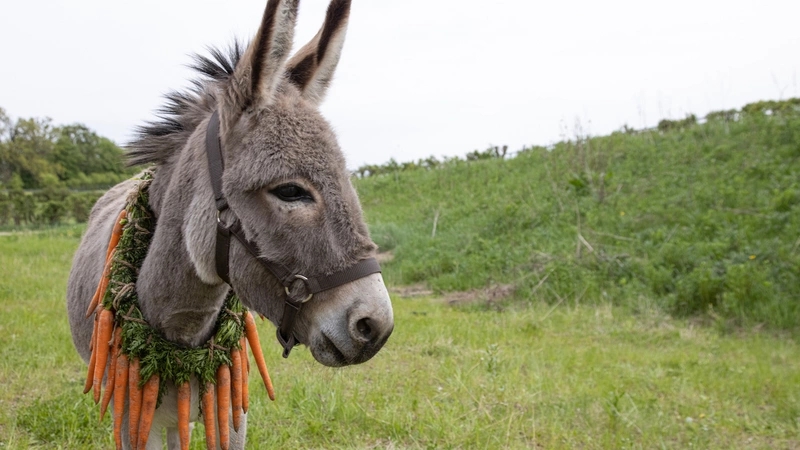Director – Jerzy Skolimowski – 2022 – Poland – Cert. 15 – 88m
*****
Forced to leave his home in the circus, a donkey undergoes a series of adventures – on BFI Player as a Subscription Exclusive along with three other Skolimowski titles on Monday, April 3rd, following its release in UK cinemas on Friday, February 3rd
After an absence of some seven years from the cinema, Skolimowski has chosen to make a movie with an animal as its central character rather than a human being. EO is a donkey (played by some six donkeys over different parts of the film) who undergoes a series of adventures as things happen around him. He starts out as a performer in a circus with a girl called Kasandra (Sandra Drzymalska), who takes good care of him and treats him with genuine affection.
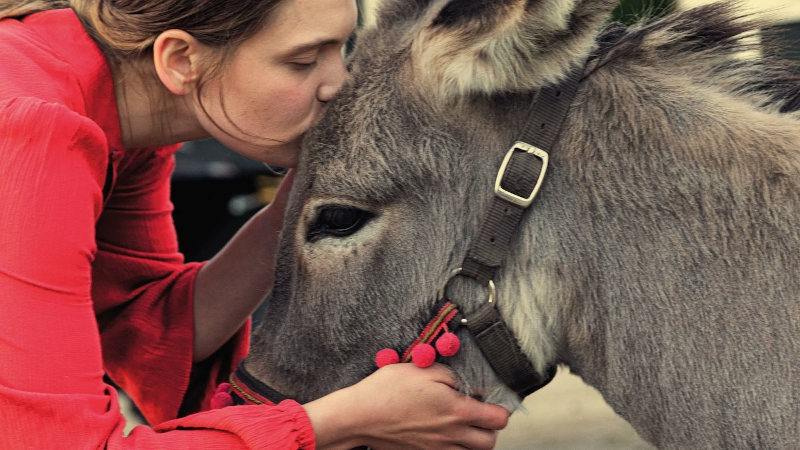
Life is good. But then he finds himself co-opted by (and Kasandra arguing with) another circus person Wasyl (Maciej Stepniak) who uses a whip on him to get him to drive a cart of rubbish to the local tip. These two episodes set the tone for what is to follow: while all the humans here use the animal for their own ends, some treat him with kindness while others don’t, rather using him as a means to an end without any sense of his being a conscious creature.
At the dump, Wasyl runs into anti-circus protests: circuses mistreat animals, apparently, so they should be offered a more humane and dignified life. That’s the idea, but after EO is led away, he must watch the official opening of a building complete with brass band and beer-swilling dignitaries before being put in a stable not with other donkeys but with horses. He and one of the horses nuzzle noses, and a friendship is struck up. But being tethered to a cart as a beast of burden while the horses receive more dignified attention proves too much, and one day he moves off with the cart causing the collapse of some shelving.
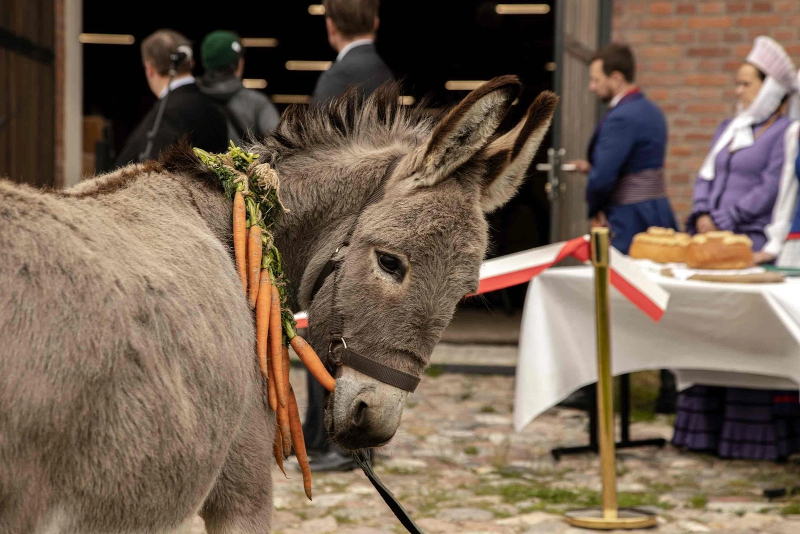
A horse box journey delivers him to a farm with other donkeys, where the creatures are used as an attraction for visiting children to ride. He remembers Kasandra, whose real name is actually Magda, with fondness and at dusk she turns up on a motorbike to see him, pet him and celebrate his birthday by feeding him his favourite treat, a carrot muffin. It’s not that long a visit, though, because the biker who gave her a lift doesn’t want to hang around too long waiting for her.
After she leaves, EO breaks out of the paddock fence to follow, but being unable to match the speed of a motor vehicle, he finds himself happily trotting along the nighttime road where he becomes a hazard to be avoided by unsympathetic, faster-travelling motorists.
EO travels on, through a yellow-lit tunnel, passing countryside overlooked by wind turbines, arrives in a deserted town (suggestive of the pandemic lockdown) where he is found by a fire crew of Zenek (Michal Przybyslawski) and a woman and tethered to their fire truck.
With the tethered EO trotting behind, Zenek drives to an amateur football match where he’s the team goalie, but during the match, another man takes pity of EO and unties him, which results in a distraction just as a penalty is being taken against Zenek’s goal, resulting in the shooter hitting the bar rather than scoring. Zenek’s winning side take the donkey on their victory march after which team and fans celebrate at the local watering hole. Feted as a hero and given beer to drink along with the partying crowd, EO takes all this in his stride.
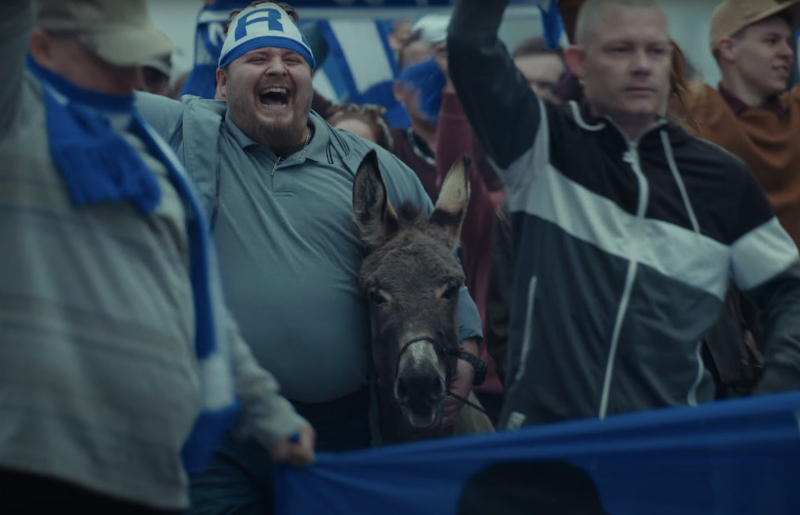
The rival fans who lost the game blame the donkey for the result, however, and turn up with clubs to beat up the winners – and, brutally, EO. (The scene is shot so that you see the thugs delivering their blows, but not the donkey on the receiving end of them; no animals were mistreated, but you feel, emotionally, that EO is being beaten up.
He winds up in an animal hospital where a domestic, just trying to be realistic, asks, “why not put it to sleep?” “We heal animals here”, comes the curt reply from a white lab coat. Once again, EO flashes back to Magda looking after him. Not all animals are healed at this place, however: electric prods are used to put down feral dogs. After EO has kicked a man in the face who is trying to get him to pull a cart, he’s put into a lorry used for transporting horses to a slaughterhouse – “horse meat for salami”, as someone comments.
They drive towards Italy, through Alpine scenery. Some time later, EO and lorry are at a service station where, after using the restroom, the Polish driver is accosted by a migrant woman, and he asks her into his cab, so he can share food. After seeing her fed, he suggests sex, explaining as she leaves the cab that it was a joke.
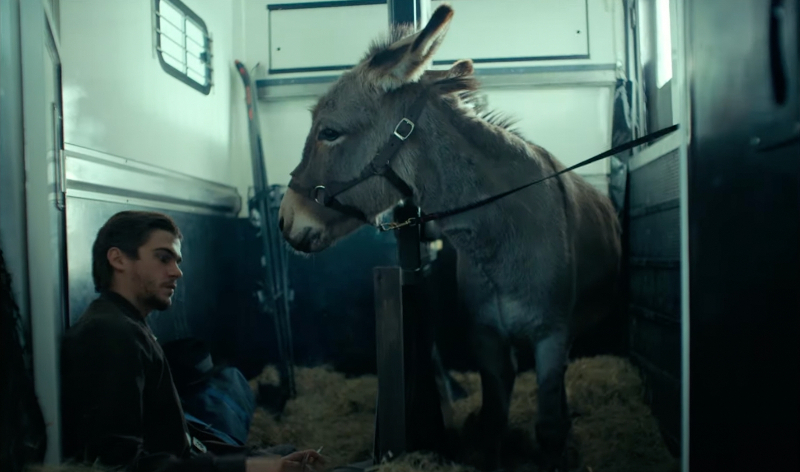
An Italian driver Vito (Lorenzo Zurzolo) later finds the abandoned EO in the back of the lorry, and gives him a lift to the large Italian estate where, it turns out, he officiates as a Catholic priest for a Countess (Isabelle Huppert) who is in the process of selling it off and conducts acrimonious phone conversations with relatives trying to get here hands on what they consider their share. The priest turns out to have a gambling problem.
EO avails himself of the beautiful woodland estate before setting off again through an unlocked gate as, once more, he remembers Magda’s kindness. This could be his final journey, as he finds himself herded down a route with bulls and cows towards a building and darkness.
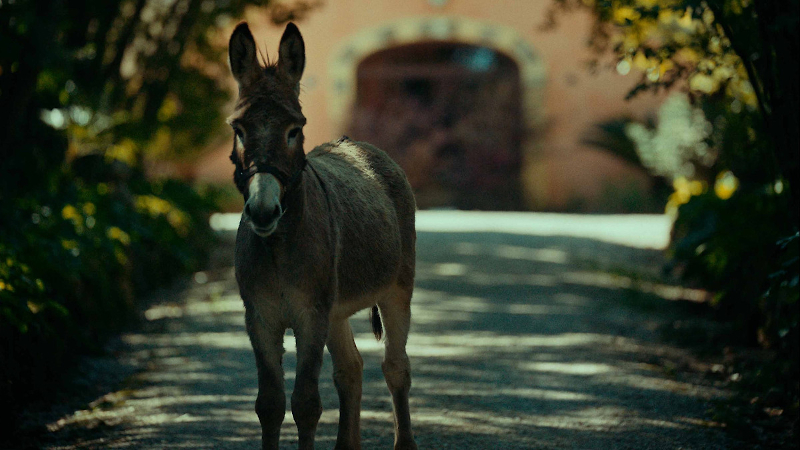
Aside from the recurring figure of Kassandra / Magda, who stands for the kindly treatment of animals, all the other human characters put in a short appearance for an episode and are then gone from the film as EO moves on. It’s basically an animal-centred road movie, and none the worse for that.
The donkey is a Sardinian breed, and you wouldn’t know he’s played by six different donkeys – the matching between the different animal “actors” is utterly seamless. The series of scenarios that occur to and around EO somehow seem less than the donkey itself – you remember it being transported in a horse box or happily trotting through this or that route, and you remember all the interactions with Magda, but everything else, even the character played by Isabelle Huppert who only appears towards the very wend, fades by comparison.
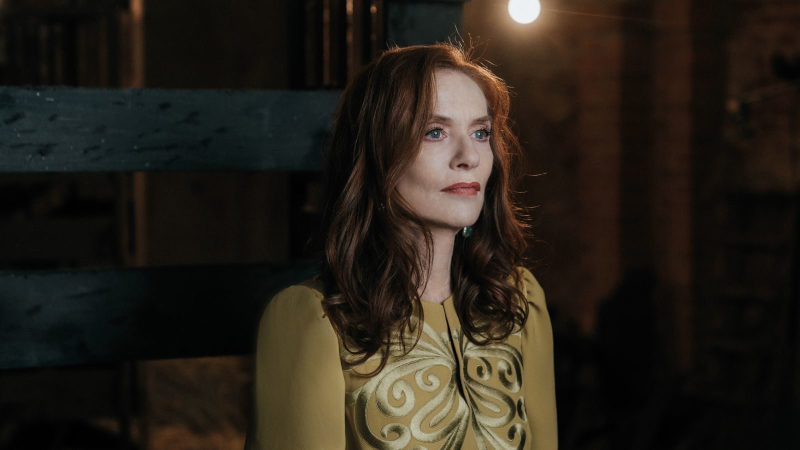
In the end, you’ve spent an hour and a half watching a good part of the life of a donkey which can’t speak in any human language yet is clearly a sentient being that can feel things as conflicting as kindness or pain. Somehow, Skolimoski puts you inside the donkey while the film plays. You see what it sees. You feel what it feels. Inspired by Au Hasard, Balthazar (Robert Bresson, 1966), it’s a remarkable achievement and a highly individual vision which makes for compelling viewing.
EO is on BFI Player as a Subscription Exclusive along with three other Skolimowski titles on Monday, April 3rd, following its release in UK cinemas on Friday, February 3rd. The other three titles are: Deep End, Le Départ and Essential Killing.
Trailer:
